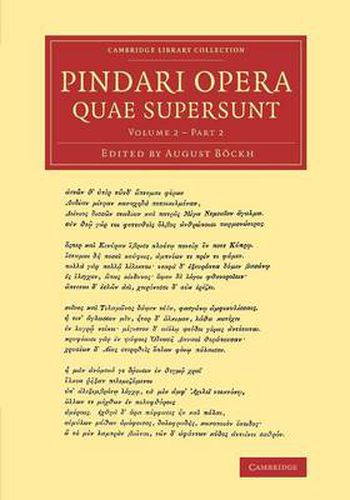Readings Newsletter
Become a Readings Member to make your shopping experience even easier.
Sign in or sign up for free!
You’re not far away from qualifying for FREE standard shipping within Australia
You’ve qualified for FREE standard shipping within Australia
The cart is loading…






One of the foremost scholars of his day, the German classicist August Boeckh (1785-1867) was chosen by the Berlin Academy of Sciences as the first editor of the monumental Corpus inscriptionum graecarum. Before that he had published this groundbreaking edition of the extant works of the Greek poet Pindar (c.522-c.443 BCE) in two volumes, the second being split into two parts. The first volume, published in 1811, contains the only complete surviving works of Pindar, the victory odes (Epinikia). The first part of the second volume, published in 1819, contained the ancient Greek scholia. This final part, published in 1821, contains the editor’s own Latin translations of Pindar’s poems, with a Latin preface and extensive critical commentary. Pindarian fragments in Greek are also included, accompanied by further Latin translations and notes. The volume concludes with thorough indexes.
$9.00 standard shipping within Australia
FREE standard shipping within Australia for orders over $100.00
Express & International shipping calculated at checkout
One of the foremost scholars of his day, the German classicist August Boeckh (1785-1867) was chosen by the Berlin Academy of Sciences as the first editor of the monumental Corpus inscriptionum graecarum. Before that he had published this groundbreaking edition of the extant works of the Greek poet Pindar (c.522-c.443 BCE) in two volumes, the second being split into two parts. The first volume, published in 1811, contains the only complete surviving works of Pindar, the victory odes (Epinikia). The first part of the second volume, published in 1819, contained the ancient Greek scholia. This final part, published in 1821, contains the editor’s own Latin translations of Pindar’s poems, with a Latin preface and extensive critical commentary. Pindarian fragments in Greek are also included, accompanied by further Latin translations and notes. The volume concludes with thorough indexes.